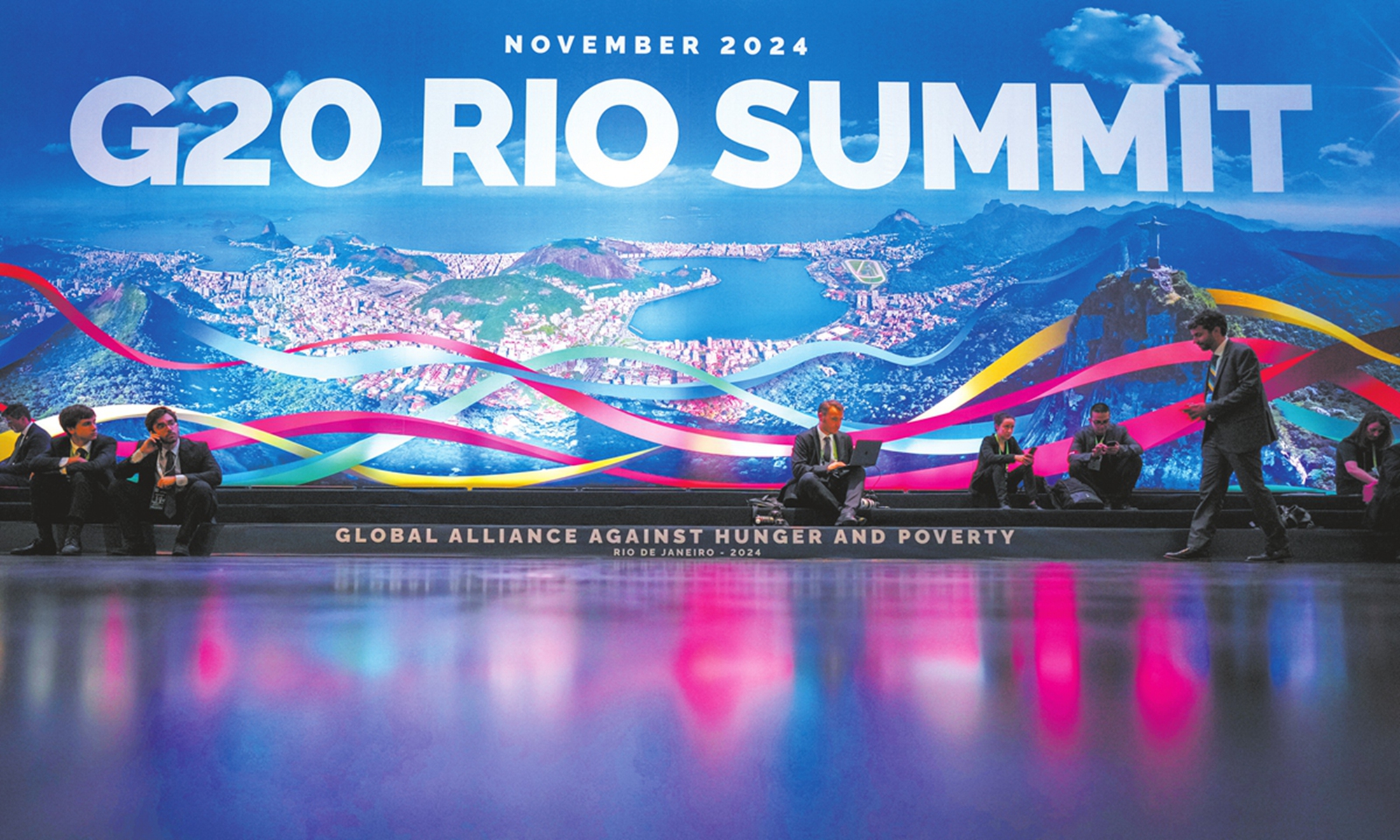
Participants sit in front of the G20 Summit logo on November 18, 2024 in Rio De Janeiro, Brazil. Photo: VCG
The Group of Twenty (G20) Leaders' Summit was recently concluded in Rio de Janeiro, Brazil. Created in 1999 and convened at the leaders' level since 2008, the G20 provides a platform for global economic communication and action-oriented coordination.
As the premier forum for international economic cooperation and an important platform for global economic governance, the G20 has a critical role to play in strengthening coordinated efforts to address prominent challenges.
Refocusing on its founding mission
Diving into the annals of history, the G20 was conceived in the wake of the late 1990s financial turmoil as a means to bolster the efforts of the G7. It expanded the global economic dialogue to encompass emerging markets and developing countries that had been previously excluded. As the world grappled with the aftermath of the 2008 financial crisis, the G20 leaders met at the Pittsburgh Summit in 2009 and solidified the group's role as the premier forum for international economic cooperation.
Today, the world again stands at a crossroads, facing increased uncertainties and instabilities. Economic globalization has encountered headwinds with the rise of unilateralism, protectionism and coercive economic measures. The global recovery has stalled, exacerbated by the widening North-South development gap and a waning drive for economic cooperation. Against this backdrop, any attempts to broaden the G20's agenda to include a myriad of other topics would be a misguided approach.
The G20 needs to refocus on its original goals of building an open world economy, promoting growth, stabilizing the financial market, and fostering trade and investment. It could establish stronger mechanisms to manage economic downturns and the increasing financial demands of developing countries. Reaffirming its commitments to collective action would help the group not only navigate current and future challenges but also rebuild its effectiveness and people's confidence in the world economy.
Refocusing on the reform of global economic governance
The G20, consolidated in the immediate aftermath of a global financial crisis, has proven to be a valuable framework for addressing global challenges. Leaders of the world's major economies recognized the imperative for the existing institutions of global economic governance to update their structures and practices to better reflect the changes in the global landscape and to more effectively resolve pressing economic and financial challenges.
The G20 once placed the reform of global economic governance high on its agenda, achieving significant progress in this regard. Thanks to the group's efforts, both the International Monetary Fund (IMF) and the World Bank increased resources. Concurrently, emerging markets and developing countries have gained greater quota and voting power within these institutions. The allocation of additional Special Drawing Rights (SDR) was also a strategic step to bolster crisis response capabilities. However, the momentum of those reforms has slowed in the past few years.
The G20 needs to take on the mantle of advancing and improving global economic governance through leadership and partnership. It is imperative for the members of this group to make unremitting efforts to push forward with reform initiatives. It is important that the World Bank carry out its shareholder review as planned in 2025. The IMF should develop a new quota formula by June 2025 to give developing countries greater representation and voice. Furthermore, the multilateral development banks should be more responsive to the needs of developing countries by participating in the Common Framework for Debt Treatments beyond the Debt Service Suspension Initiative.
Refocusing on the most common agenda
The G20 comprises 19 countries and two regional bodies, representing around 85 percent of the world's GDP, more than 75 percent of global trade and about two-thirds of the world's population. Given its significant influence, the group occupies a unique position and plays a pivotal role in shaping a global agenda for a more equitable and sustainable future.
Undoubtedly, the most common agenda for nations worldwide is development. Nevertheless, as UN Secretary-General António Guterres has cautioned, only 15 percent of the Sustainable Development Goals (SDGs) targets are on track, and all stakeholders need to step up to rescue the SDGs. The G20 has a critical role to play in expediting the implementation of the 2030 Agenda for Sustainable Development, designed for more inclusive and resilient development that benefits all members of the international community.
This year's G20 President Brazil has urged the group to focus on addressing development challenges head-on. To make that happen, the G20 needs to deepen cooperation partnerships, mobilize additional resources and enhance synergy in actions that support global development efforts.
The author is a commentator on international affairs, writing regularly for Xinhua News, Global Times, China Daily, CGTN etc. He can be reached at xinping604@gmail.com.



